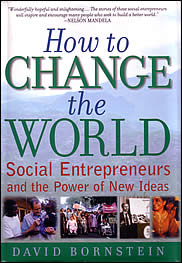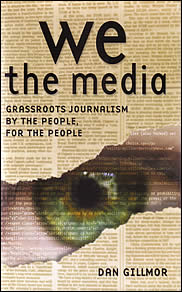How to Change the World
 Escuché una conferencia de David Bornstein en IT Conversations. Hablaba de nuevas formas de cambiar el mundo y de ayudar allí donde sea necesario, así que me compré el libro (lo malo de IT Conversations es qué haces cuando un conferenciante te gusta mucho y no tiene libro). Llevo unas 80 páginas y va muy interesante.
Escuché una conferencia de David Bornstein en IT Conversations. Hablaba de nuevas formas de cambiar el mundo y de ayudar allí donde sea necesario, así que me compré el libro (lo malo de IT Conversations es qué haces cuando un conferenciante te gusta mucho y no tiene libro). Llevo unas 80 páginas y va muy interesante.
De la contraportada:
What business entrepreneurs are to the economy, social entrepreneurs are to social change. They are, writes David Bornstein, the driven, creative individuals who question the status quo, exploit new opportunities, refuse to give up-and remake the world for the better.
How to Change the World tells the fascinating stories of these remarkable individuals many in the United States, others in countries from Brazil to Hungary-providing an In Search of Excellence for the nonprofit sector. In America, one man, J. B. Schramm, has helped thousands of low-income high school students get into college. In South Africa, one woman, Veronica Khosa, developed a homebased care model for AIDS patients that changed government health policy. In Brazil, Fábio Rosa helped bring electricity to hundreds of thousands of remote rural residents. Another American, James Grant, is credited with saving 25 million lives by leading and «marketing» a global campaign for immunization. Yet another, Bill Drayton, created a pioneering foundation, Ashoka, that has funded and supported these social entrepreneurs and over a thousand like them, leveraging the power of their ideas across the globe.
These extraordinary stories highlight a massive transformation that is going largely unreported by the media: Around the world, the fastest-growing segment of society is the nonprofit sector, as millions of ordinary people-social entrepreneurs-are increasingly stepping in to solve problems where governments and bureaucracies have failed. How to Change the World shows, as its title suggests, that with determination and innovation, even a single person can make a surprising difference. For anyone seeking to make a positive mark on the world, this will be both an inspiring read and an invaluable handbook. It w-ill change the way you see the world.
El término «emprendedor social» suena un poco raro. El izquierdoso que llevo dentro se rebela. No parece propio llamar emprendedor, con esas connotaciones tan mercantiles, a alguien que resuelve problemas sociales. Parece que tendrá que acostumbrarse.
 Compré este libro como parte el proceso de documentación para mi charla en Granada -que se titulaba, por cierto, «La locura del método». No llegó a tiempo, así que no incluí nada. Pero leyendo la introducción, encuentro curiosas coincidencias de pensamiento (por ejemplo, Dan Gillmor parece opinar, como yo, que no estamos haciendo nada fundamentalmente nuevo, sino que lo hacemos de otra forma) por lo que creo que la lectura va a ser muy interesante.
Compré este libro como parte el proceso de documentación para mi charla en Granada -que se titulaba, por cierto, «La locura del método». No llegó a tiempo, así que no incluí nada. Pero leyendo la introducción, encuentro curiosas coincidencias de pensamiento (por ejemplo, Dan Gillmor parece opinar, como yo, que no estamos haciendo nada fundamentalmente nuevo, sino que lo hacemos de otra forma) por lo que creo que la lectura va a ser muy interesante.